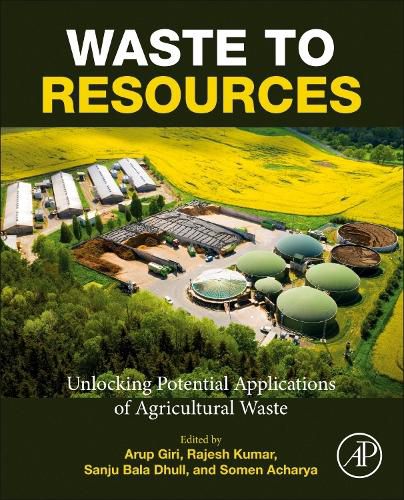Readings Newsletter
Become a Readings Member to make your shopping experience even easier.
Sign in or sign up for free!
You’re not far away from qualifying for FREE standard shipping within Australia
You’ve qualified for FREE standard shipping within Australia
The cart is loading…






Waste to Resources: Unlocking Potential Applications of Agricultural Waste is a comprehensive textbook that explores various types of agricultural waste, their sources, and composition. Growing environmental concerns create a need to deploy sustainable processes within agriculture. This book sheds light on waste management techniques, covering both theory and practice, and advocates for re-framing agricultural waste as a valuable resource. It takes into account the latest research and regulatory considerations to give a well-rounded understanding of the subject. This textbook is an essential resource for upper-level undergraduate students, researchers, and professionals in environmental science and agricultural biology.
The introductory chapters provide an overview of agricultural waste, including crop residues, livestock waste, pesticides, and chemical waste, and describe the environmental implications of these categories. The subsequent chapters delve into waste management techniques such as biogas production, nutrient recovery, recycling, and composting. The final chapter explores the regulatory and policy issues related to sustainable agricultural waste management.
$9.00 standard shipping within Australia
FREE standard shipping within Australia for orders over $100.00
Express & International shipping calculated at checkout
Stock availability can be subject to change without notice. We recommend calling the shop or contacting our online team to check availability of low stock items. Please see our Shopping Online page for more details.
Waste to Resources: Unlocking Potential Applications of Agricultural Waste is a comprehensive textbook that explores various types of agricultural waste, their sources, and composition. Growing environmental concerns create a need to deploy sustainable processes within agriculture. This book sheds light on waste management techniques, covering both theory and practice, and advocates for re-framing agricultural waste as a valuable resource. It takes into account the latest research and regulatory considerations to give a well-rounded understanding of the subject. This textbook is an essential resource for upper-level undergraduate students, researchers, and professionals in environmental science and agricultural biology.
The introductory chapters provide an overview of agricultural waste, including crop residues, livestock waste, pesticides, and chemical waste, and describe the environmental implications of these categories. The subsequent chapters delve into waste management techniques such as biogas production, nutrient recovery, recycling, and composting. The final chapter explores the regulatory and policy issues related to sustainable agricultural waste management.